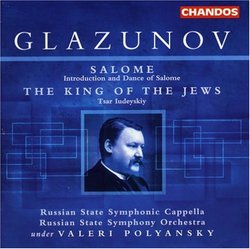Agreeable Performnaces, lack Rozhdestvensky's dramatic flair
David A. Hollingsworth | Washington, DC USA | 07/26/2000
(4 out of 5 stars)
"An interesting CD, most especially since: 1) it's the second Chandos release of Alexander Glazunov's incidental score "Tsar Iudeyskiy" in 4 years (the first released in 1996 & with the same orchestra, same Capella, but with a different conductor), 2) it's the third complete recording of the work in four years (one of three recordings made by Naxos & likewise released in 1996), & 3) the newest recording is coupled with another work (Introduction & Dance of Salome). It's hardly surprising for somewhat of a surge of interest to prop up surrounding "Tsar Iudeyskiy", since it is appealing & the thematic ideas nicely linked together (despite the play fragmentary in nature by it's January 9th, 1914 premiere). The play was written by the Grand Duke Konstantin Konstantinovich Romanov who commissioned Glazunov for the score. The play was shelved & forgotten, but the music legitimately survives (the 1970s premiere recording was given by Siegfried Kohler & the Stuttgart Philharmonic-but minus the choral passages & over 20 bars of orchestral music). Valeri Polyansky has become a chief pioneer in the recordings of Glazunov's works & the results yield some satisfaction (the brass undernourished, the recording a little recessed, the performances not as charismatic as in Fedoseyev, Rozhdestvensky, or even Svetlanov). The same shortcomings exist in these performances on this disc, unfortunately. There's no doubt that Polyansky brought warmth & sympathy in his readings of the works & the vividness is all but dismissible here. But unlike Rozdestvensky (with the Russian State Symphony Orchestra & the Russian State Symphonic Cappella), Polyansky (with the same ensembles) fails to drive the playing hard enough to make the works wholly convincing & captivating. This is especially true in the Introduction of Salome, with the Tchaikovskian opening & the very active & dramatic measures which follow. Polyansky's reading of the Dance of Salome was well paced, however, not allowing the music to sound overlonged. But, for "Tsar Iudeyskiy" the drama, the spirit, & the vividness were more captured by Rozhdestvensky than by Polyansky, especially in the Entrance of Christ into Jerusalem where immediately one senses something grand & sensation about to enter into one's consciousness. The Cappella is as polished & immaculated as it was under Rozhdestvensky. But the orchestra is a little too lightfooted for the demands of the works. The recording on this disc has more richer opulence of sound than the previous Chandos disc. But, of all the recordings of "Tsar Iudeyskiy", Rozhdestvensky remains unbeatable."

